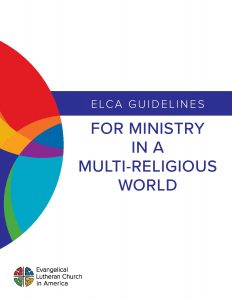Guidelines for Ministry in a Multi-Religious World
Evangelical Lutheran Church in America (ELCA)
 Guidelines for Ministry in a Multi-Religious World
Guidelines for Ministry in a Multi-Religious World
CHICAGO, USA/GENEVA
1/8/2022
Evangelical Lutheran Church in America shares suggestions for planning interfaith services and events
(LWI) – Responding to the rapidly changing religious landscape in the United States, the Evangelical Lutheran Church in America (ELCA) has published a new set of guidelines for ministry in a multi-religious world. Designed for pastors, deacons and others engaging in interfaith work, the document contains a wealth of considerations and planning suggestions for organizing interreligious services such as weddings, funerals, ordinations or responses to national tragedies and crises.
The guidelines grow out of a 2019 Declaration of Inter-Religious Commitment which the ELCA developed to provide a theological grounding for the growing engagement of Lutherans with people from other faith communities. The new document is the fruit of widespread consultation among both Lutherans and their ecumenical and interreligious partners, with over 2.600 people responding to a survey to share their “experience, expertise and collective wisdom” with the drafting committee.
“Our landscape is changing so rapidly that every community is being shaped by new religious realities,” says Kathryn Lohre, ELCA’s Executive for Ecumenical and Inter-Religious Relations and Theological Discernment. While people often think of religious diversity in urban areas, she notes that waves of migration and refugee resettlement mean that rural areas and small towns are also experiencing new levels of ethnic and religious diversity.
Despite this growing diversity, Lohre continues, “the response to a tragedy in one place will still look very different to the response in another which may be newer to the challenges of a multifaith reality.” Though the committee received requests for templates to help with the organization of inter-religious events, she says, “we decided that there is no one-size-fits-all model because contexts absolutely matter and relationships must be at the heart of this ministry.”
Consultation between Lutherans and their interfaith partners must guide the response and the planning, the guidelines insist, in order “to honor the integrity, distinctive commitments and gifts of each tradition.” It is vital to “spend time building relationships of trust and respect before attempting to put together a formal event that can lead to misunderstanding or even harm,” they add.
The new document acknowledges the “misunderstanding, prejudice, abuse and violence” that has characterized relationships between Christians, including Lutherans, and other faith traditions in the past. “We must be sensitive to the ways we may have hurt each other (in the past and in the present),” it says, because “even simply acknowledging such a history is an important step in the direction of healing and reconciliation.”
Mutual learning to enrich self-understanding
Both the new guidelines and the Declaration clearly articulate the church’s commitment to evangelism, affirming that “the gospel, or good news is at the heart of our faith,” inspiring and shaping “the way we engage with our neighbors.” Nevertheless, Lohre recognizes that inter-religious tensions persist, often inflamed by xenophobic and anti-Islamic rhetoric. “Not all people in our church accept that we ought to be engaging in this kind of ministry,” she notes. “Yet the guidelines point out that interfaith engagement usually enriches our own faith as we have to be clear about who we are and what we believe,” she says. Our goal is “to up-end fears and show that by loving our neighbors, we can find deeper, richer self-understanding within our own faith context,” she adds.
As a mother of four, Lohre points out that “my own children are aware of this truth about religious diversity in a way that I wasn’t when growing up, even though I had friends who were Jewish, Muslim, Hindu, Sikh and Buddhist.” Such awareness of mutual enrichment marks “a step beyond tolerance to engagement” and gives Lohre much hope in her day-to-day work.
She and the other authors of the guidelines are encouraged by the positive feedback they have received, including from their interfaith partners who were asked to review the final draft before publication. “Our inter-religious partners can hold up a mirror to reflect how they see us,” Lohre says. “In doing so, they can help us to see more clearly who we want to become and how we can continue to grow together.”
Source: https://www.lutheranworld.org/news/guidelines-ministry-multi-religious-world
To download document click on Guidelines for Ministry in a Multi-Religious World
